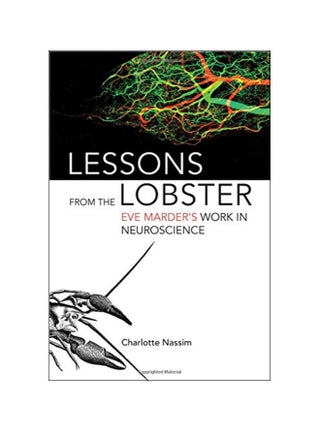استرجاع مجاني وسهل
أفضل العروض
| الناشر | Mit Press |
| تنسيق الكتاب | غلاف صلب |
| وصف الكتاب | How forty years of research on thirty neurons in the stomach of a lobster has yielded valuable insights for the study of the human brain. Neuroscientist Eve Marder has spent forty years studying thirty neurons on the stomach of a lobster. Her focus on this tiny network of cells has yielded valuable insights into the much more complex workings of the human brain; she has become a leading voice in neuroscience. In Lessons from the Lobster, Charlotte Nassim describes Marder's work and its significance accessibly and engagingly, tracing the evolution of a supremely gifted scientist's ideas. From the lobster's digestion to human thought is very big leap indeed. Our brains selectively recruit networks from about ninety billion available neurons; the connections are extremely complex. Nevertheless, as Nassim explains, Marder's study of a microscopic knot of stomatogastric neurons in lobsters and crabs, a small network with a countable number of neurons, has laid vital foundations for current brain research projects. Marder's approach is as intuitive as it is analytic, but always firmly anchored to data. Every scrap of information is a pointer for Marder; her discoveries depend on her own creative thinking as much as her laboratory's findings. Nassim describes Marder's important findings on neuromodulation, the secrets of neuronal networks, and homeostasis. Her recognition of the importance of animal-to-animal variability has influenced research methods everywhere. Marder has run her laboratory at Brandeis University since 1978. She was President of the Society for Neuroscience in 2008 and she is the recipient of numerous awards, including the 2016 Kavli Award in Neuroscience and the 2013 Gruber Prize in Neuroscience. Research that reaches the headlines often depends on technical fireworks, and especially on spectacular images. Marder's work seldom fits that pattern, but this book demonstrates that a brilliant scientist working carefully and thoughtfully can produce groundbreaking results. |
| عن المؤلف | John E. Dowling is professor emeritus at Harvard University, and has done extensive research into the neurobiology of vision. He lives in Boston, Massachusetts. |
| تاريخ النشر | 7/16/2018 |
| رقم الكتاب المعياري الدولي 13 | 9780262037785 |
| اللغة | الإنجليزية |
| المراجعة التحريرية | Understanding the Brain delivers a great review of the neurobiology, systems, and frontiers of cognitive neuroscience…. Dowling is a master teacher, having collected quips, stories, and illustrations over 30 years…. You can see why freshmen could be captivated by these illustrations of the complex physiology of the synapse. And for the practitioner, Dowling provides teaching stories for our clinical encounters…. I recommend this book to physicians interested in the brain, and in thinking about thinking, as it provides a rich review that we might leverage for our patients, and our own aging and dynamic brains and minds. —Family Medicine Dowling has taught neuroscience to various types of students over many years, and in the course of this teaching, he has learned what things are easy and hard to understand, what students find interesting and boring, and how to explain brain function at different levels of detail...We can be grateful that there are neuroscientists such as Dowling who so engagingly bring their mastery of the subject to a broader readership.—The FASEB Journal. I would recommend this book to residents, psychiatrists, and general practitioners, as well as to individuals new to neuroscience...He keeps the material relevant and the reader engaged while providing a great overview. —Journal of Psychiatric Practice |
| رقم الطبعة | 1 |
| عدد الصفحات | 264 |

